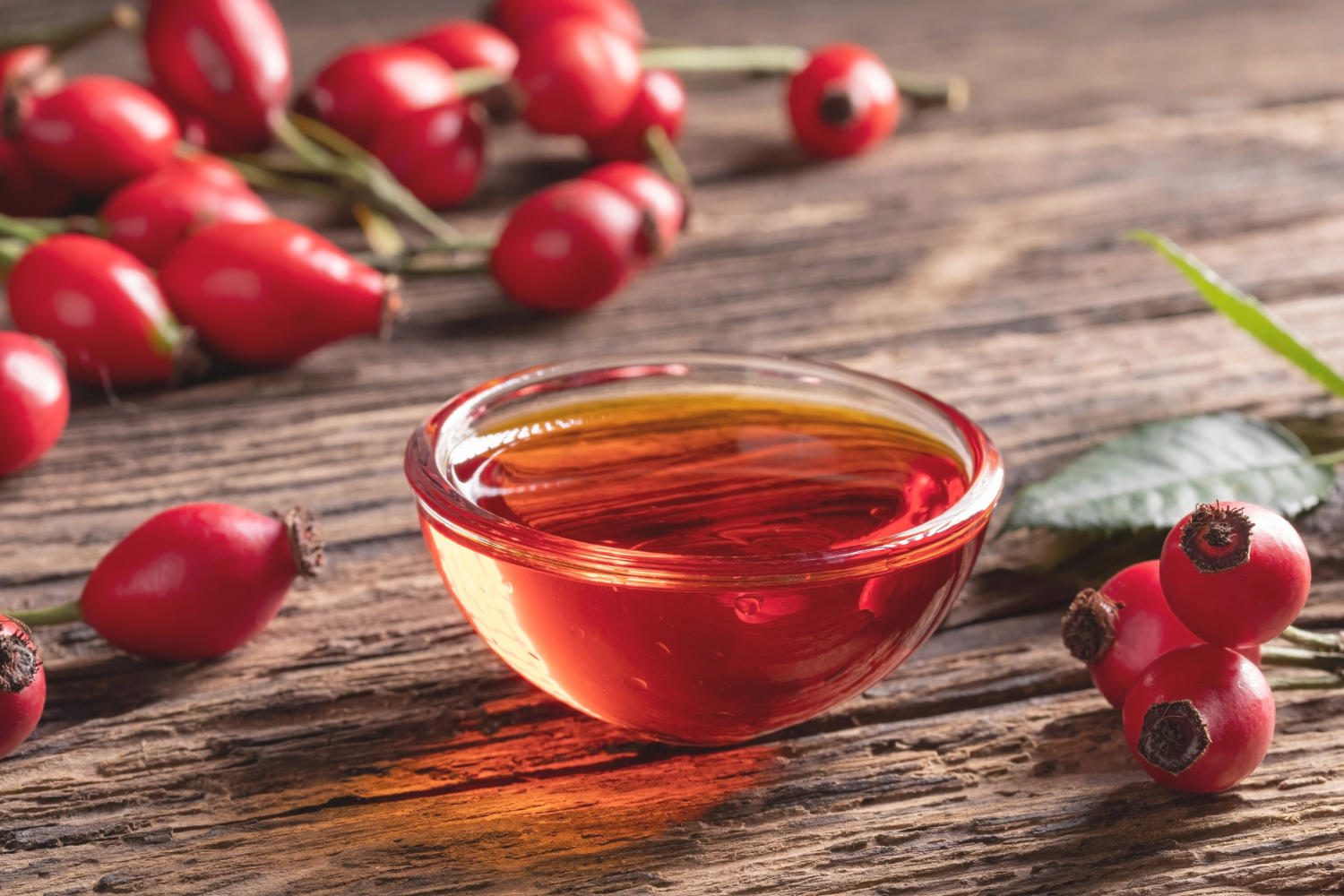Discover the benefits of rosehip oil for face, skin, and hair. Learn how it works with collagen, and let’s compare it to retinol, and why this natural oil is a powerhouse for hydration, anti-aging, and your overall glow.
Why Rosehip Oil Deserves the Hype
If you’ve been searching for a natural way to hydrate your skin, smooth fine lines, or even revive dull hair, you’ve probably heard the buzz around rosehip oil. Nicknamed, “nature’s retinol” and praised by dermatologists and beauty enthusiasts alike, rosehip oil is more than a trend, it’s a centuries-old beauty secret backed by modern science.
So, what is rosehip oil good for? In this ultimate guide, we’ll explore the benefits of rosehip oil for face, skin, and hair, uncover its relationship with retinol and collagen, and show you why this golden oil might just become your new self-care essential.
What exactly is Rosehip Oil?
Rosehip oil is cold-pressed from the fruit and seeds of the wild rose bush (Rosa canina), commonly grown in Chile and South Africa. Unlike rose essential oil, which is extracted from petals, rosehip oil comes from the hips and seeds, making it uniquely packed with nutrients:
- Essential fatty acids (omega-3, 6 and 9)
- Vitamins A, C and E
- Antioxidants like lycopene and beta-carotone
These compounds give rosehip oil its reputation as a hydrating, anti-aging, and skin-repairing powerhouse.
Rosehip Oil for Skin: A Natural Multitasker
When it comes to skincare, rosehip oil delivers results that rival expensive serums. Here’s what makes it so powerful:
- Hydrates without the Gresiness
Rosehip oil is lightweight and non-comedogenic, meaning it won’t clog pores. High in linoleic acid content which helps lock in moisture while strengthening your skin barrier.
* Perfect for dry, dehydrated, or sensitive skin.
- Reduces Wrinkles and Fine Lines
Thanks to its vitamin A (retinoid) and vitamin C content, rosehip oil stimulates collagen production and improves skin elasticity.
- A 2015 clinical study found that women using rosehip powder daily experienced a 33% reduction in wrinkle depth within 8 weeks.
- Fades, Scars, and Hyperpigmentation
Rosehip oil is one of the few natural oils clinically shown to reduce scarring. In surgical trials, patients applying rosehip oil saw significant improvement in scar redness and texture within 12 weeks.
- Soothes Inflammation and Redness
Packed with anti-inflammatory fatty acids, rosehip oil calms down irritation and can help with conditions like eczema, rosacea, and acne flare-ups.
Quick Tip: For best results, apply 2-3 drops of rosehip oil to clean, damp skin at night before applying your moisturiser.
Rosehip Oil for Face: The Secret to a Natural Glow
Many people wonder: “Is rosehip oil good for your face?” The answer is a resounding yes.
Here’s why:
- Brightens dull skin: Vitamin C evens out skin tone for a radiant complexion.
- Protects against premature ageing: Antioxidants defend against UV and pollution damage.
- Balances oil production: Great for both oily and dry skin types.
* How to use: Add 2 drops into your daily moisturiser or foundation for an instant dewy glow.
Rosehip Oil for Hair: Shine, Strength, and Scalp Health
Rosehip oil isn’t just for your face, it is also an underrated hero for haircare.
- Restoring Natural Shine
Its fatty acids coat each strand, smoothing frizz and bringing back shine to dull, brittle hair.
- Strengthens and Protects
Vitamin E helps reduce breakage, while antioxidants protect against environmental stressors like heat and pollution.
- Soothes the Scalp
Anti-inflammatory properties calm down dry, itchy, or flaky scalps, while balancing sebum production.
*How to use: Massage a few drops into your scalp before shampooing, or blend into conditioner for an extra hydration boost.
Rosehip Oil and Retinol: Natural Alternative or Perfect Match?
One of the biggest debates in skincare is whether rosehip oil can replace retinol. The truth is:
- Rosehip oil naturally contains retinol (vitamin A derivative), which makes it more gentler than prescription retinol.
- While it may not deliver results as quickly as synthetic retinol, it’s more ideal for sensitive skin that reacts poorly to stronger formulas.
- For some, combining rosehip oil with low-strength retinol offers the perfect balance of power and gentleness.
If you’re wary of irritation but want anti-aging benefits, rosehip oil is often called a “retinol for beginners.”
Rosehip Oil with Collagen: Supporting Skin’s Foundation
Collagen is the protein that keeps skin firm, plump, and youthful, but our natural production drops by 1% every year after the age of 25. That’s where rosehip oil steps in:
- Vitamin C in rosehip oil is essential for collagen synthesis.
- Vitamin A (retinold) helps stimulate new collagen production.
- Antioxidants protect existing collagen from breakdown caused by free radicals.
In other words, rosehip oil not only supports collagen formation but also helps protect the collagen you already have.
How to use Rosehip Oil (Step-by Step)
Want to add rosehip oil into your routine? Here’s a simple guide:
For Face & Skin
- Cleanse your skin.
- Apply 2-3 drops of rosehip oil to damp skin.
- Massage gently in upward motions.
- Follow with a moisturiser or SPF in the morning.
For Hair
- Warm a few drops between your palms.
- Massage into the scalp or smooth onto the ends.
- Leave overnight or rinse after 30 minutes. (Use a shower cap to protect your pillows!)
For Body
- Apply to stretch marks, scars, or dry patches.
- Massage until fully absorbed.
Why Rosehip Oil is Here to Stay
The global natural skincare market was valued at $6.7 billion in 2022 and is projected to grow at 6-8% annually through 2030. With consumers seeking effective, clean, and sustainable alternatives, oils like rosehip oil are leading the movement.
Rosehip oil isn’t just a trend, it’s a scientifically backed, eco-friendly choice that delivers visible results for skin, face, and hair.
Is Rosehip Oil Worth It?
If you’re looking for a natural solution for glowing skin, youthful radiance, and healthier hair, rosehip oil is one of the best investments you can make.
From supporting collagen production to offering a gentler alternative to retinol, this oil proves that luxury skincare doesn’t need to come in a synthetic bottle, it can be found in nature.
Whether you use rosehip oil for face, skin, hair, with collagen, or alongside retinol, the benefits are undeniable.
Ready to see what rosehip oil can do for you? Start by adding it to your daily skincare or haircare ritual and watch your glow transform.
Already tried rosehip oil? Share your experience and photos on Instagram using #GlowWithSoleilRa #SoleilRaSkinRitual #LoveSoleilRa let’s inspire more women to embrace natural skincare together.

